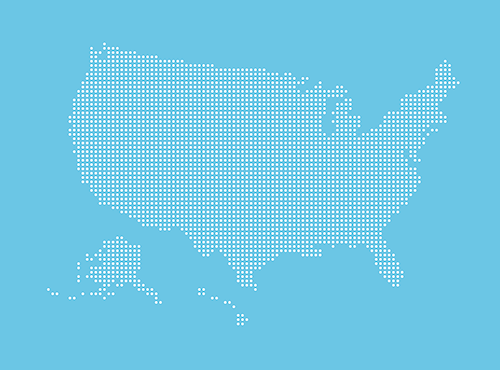
PROVIDENCE, R.I. [Brown University] —A new poll of voters across the U.S. reveals evidence that Americans distrust the government, feel unable to manage major or long-term expenses, and think that the level of overall safety and security is stagnant or worsening.
As the country’s midterm elections approach in November 2018, Democrats have a 9 percentage-point advantage over Republicans overall on a generic congressional ballot, the poll found as well.
And while Democratic and Republican respondents remain largely loyal to their party’s candidates heading into the midterms, independent voters and individuals who identify with minor parties (like the Green Party) rather than one of the two major parties appear to be roughly split — 31 percent say they'll vote for a Republican candidate, 25 percent for a Democrat and 44 percent are undecided.
In late June, when the poll was conducted, President Trump's approval rating stood at 37 percent overall, but at 83.6 percent among Republicans and 43.9 percent among respondents with the least amount of formal education.
The Taubman Center for American Politics and Policy at Brown University’s Watson Institute for International and Public Affairs conducted the poll as part of a revamped approach to polling that aligns with the center’s core research themes: the cost of living, the value of democracy and the price of security.
In addition to questions about current politics, the survey asked voters about economic well-being, the performance of government, immigration, drug addiction, public schools, terrorism and U.S. involvement in international conflicts.
The answers showed areas of common concern as well as the impact of partisan divides on the perceptions of individuals across the country, said political scientist Susan Moffitt, director of the Taubman Center.
“Stark differences in Americans’ perceptions on issues ranging from economic well-being to immigration continue to emerge along party lines,” Moffitt said. “Yet one area where the two sides share common ground is their dissatisfaction with American democracy: both sides feel forgotten and don’t trust the government to do what is right.”
Overall, the public lacks trust in the government’s ability to protect its rights, the poll found. Only one in four respondents reported feeling the government listens to people like them; and just one in five agreed that government could be trusted to do what is right. Black Americans are significantly more likely, as compared to white Americans, to feel ignored, mistreated, taken advantage of and treated like less than full citizens, Moffitt said.
Yet in contrast to pervasive distrust and resentment toward the federal government, large majorities of respondents rarely feel mistreated by public schools (72.1%) or by their local governments (64.3%), the results found.
The poll found that a majority of respondents (58.1%) felt they have enough money to pay for day-to-day expenses like groceries but lack the money for more significant expenses like saving for retirement or buying a house.
A deeper dive into the issue of cost of living demonstrates that party affiliation, sex and age affected how respondents assessed their economic wellbeing. Overall, 80 percent of Republicans and 81 percent of individuals with high incomes feel good about the economy, in contrast to 34 percent of Democrats and 37 percent of individuals with low incomes. Partisan and income differences hold across a range of economic measures, Moffitt said.
Large and persistent gaps also appear between women and men: 58 percent of men feel good about their family’s income and budget, compared with only 47 percent of women. These differences become pronounced in middle age and then persist up the age distribution.
Moffitt noted that a majority of the public perceives many aspects of safety as either about the same or a bit worse today relative to 10 years ago. The public’s sense of school safety has declined markedly, with 56 percent of respondents reporting that the security of schools has worsened over the past decade. On the issue of drug addiction, over 74 percent of respondents felt the crisis had worsened.
Where clear partisan divides exist is on the issue of illegal immigration. A plurality of Democrats and independents think the issue has remained about the same in the past 10 years (41.5 percent), while 33.6 percent think it’s gotten worse and 15.9 percent feel it’s improved. In contrast, three-quarters of Republican respondents think illegal immigration has gotten much worse or somewhat worse in the past decade.
Precisely how these attitudes will ultimately influence the upcoming midterm elections is unclear, Moffitt said.
“Control over the House remains uncertain and in play,” Moffitt said. “While Democrats have a lead overall on the generic ballot, Republicans currently have an edge among independent voters and a full 21 percent of the sample remains undecided.”
Methodology and data
The Taubman Center poll results were based on an online panel of 1,000 respondents that the nonpartisan polling organization YouGov selected using a technique called matched random sampling.
“YouGov starts by drawing random sample from the target population — U.S. adults — using the 2016 American Community Survey (ACS) one-year sample,” explained Paul Testa, an assistant professor of political science at Brown. “Next, YouGov uses an algorithm to select respondents from its online panel of 1.8 million U.S. residents who are a close match to the individuals sampled from the ACS on gender, age, race and education. The final results are then weighted by respondents’ 2016 presidential vote choice and a four-way stratification of gender, age, race and education.”
Overall, the approach yields a national sample of comparable utility to other common methods like telephone surveys using random digit dialing, Testa added.
The raw data is available on the Taubman Center website, along with an interactive tool that allows users to quickly create visual representations of the data.